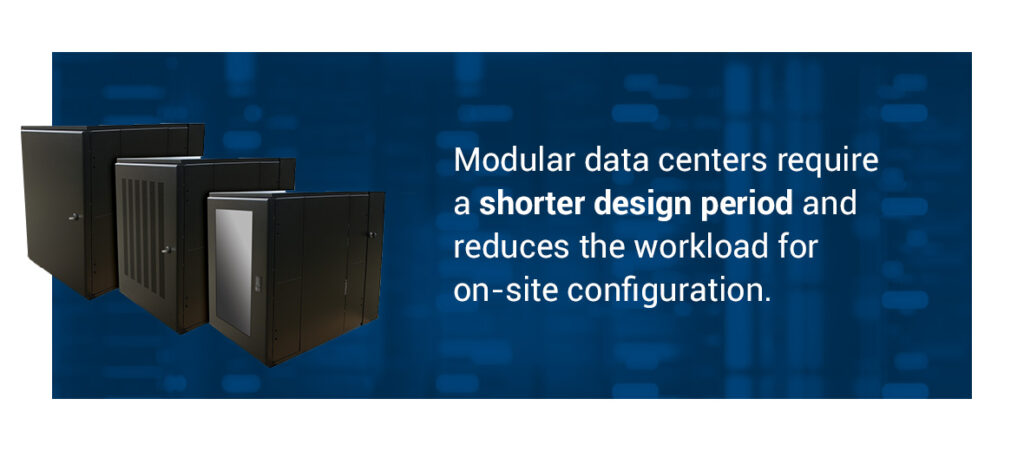Best Practices for Data Center Scalability and Flexibility

Various services and industries rely on data centers as the backbone of their IT operations. As the demand for data and computing power grows, data centers need to be able to keep up with organizational needs.
How can data centers continue to remain flexible and scale as needs and technology change? Keep reading to learn more in our complete guide to data center scalability best practices.
Understanding Scalability and Flexibility in Data Centers
Scalability refers to an organization’s ability to grow, manage and meet demands in a capable manner. In the context of data centers, it measures a data center’s ability to increase and decrease resources according to the demand placed on it.
For example, as the workload increases due to taking on more customers, you need to be able to add computers and servers to handle the added volume. If you cannot scale your data center while maintaining data security and availability, you run the risk of data breaches, cost overruns and inefficiencies.
At the same time, organizations need to facilitate flexibility in both data center design and implementation. When a data center is flexible, it can meet the changing needs of its customers over time. Modular design in a data center facilitates flexibility, allowing you to quickly deploy new services and change the storage space without significantly altering existing infrastructure. This design methodology consists of prefabricated components you can quickly deploy, configure and replace.
Challenges in Data Center Scalability
As data centers grow, they face unique challenges, which they can overcome with the correct planning. Consider the following:
- Infrastructure costs: Expansions and upgrades to infrastructure come with various costs. Consider the total cost of ownership along with future needs and compare it with the benefits of scaling your business. Evaluate which storage solution makes it easier to scale your business.
- Server overwhelm: As user traffic increases, it places higher demand on your services. Organizations must practice efficient load balancing and traffic management to prevent downtimes and slower traffic.
- Security and privacy: Scaling can introduce vulnerabilities that lead to data breaches. Each extra server or system must have the proper security setup to maintain access restrictions. Regular security audits will help you to monitor the system for weak points.
Techniques to Consider When Scaling a Data Center
As the demand for data storage grows in the digital age, organizations must update to the changing requirements while maintaining efficiency, flexibility, reliability and performance. Let’s explore some of the best practices data centers can adopt to optimize operations.
Implementing a Modular Design
A modular design can give your data center a series of advantages. Consider the following:
- Rapid deployment and shorter construction period: Modular data centers require a shorter design period. The standardized design reduces the workload for on-site configuration and shortens the time for installation.
- Expendability: Organizations can easily add more modules depending on the customer’s requirements.
- Reliable modules: Modular design features a standardized and highly integrated design that makes the system more stable.
- Environmental protection and energy conservation: Power costs make up a significant portion of the total cost of ownership. Planning the data center according to the organization’s current IT requirements and only adding modules leads to cost savings, as you only power the required equipment.

Choosing the right modular design products can make a significant difference in how well they work for your data center. Emcor’s modular enclosures and design solutions provide reliability and efficiency. We offer customizable solutions for your data center, no matter the stage of your project.
Practicing Efficient Cable Routing
Efficient data center cable routing can help organizations save time and money. When your cables are organized and managed properly, it eliminates confusion and clutter, making it easier to access racks and servers and trace cables.
If you know how many cables you have and exactly where they go, you can better plan your capacity, forecast when you will run out of space and make the most of your current infrastructure. Cable management also enables faster decision-making — having a real-time view of physical assets and easy access to connections makes it simpler to make changes.
Investing in Automation Processes
As data centers take on more customers and their data, manual processes are too slow to keep up with the speed at which organizations operate. Automation can make many monotonous, day-to-day operations autonomous. Generally, automation includes several benefits for a flexible and scalable data center:
- Frees time for staff to perform other, more complex functions
- Reduces the risk of human errors
- Enables quick issue resolution
- Provides a unified view of all systems and applications
Creating More Energy-Efficient Systems
As centers scale, energy efficiency can become a challenge. In many cases, improving IT capabilities has the most significant impact on power usage efficiency. Organizations can improve efficiency by:
- Optimizing power: Actions such as cleaning up workloads, consolidating machines and replacing older servers can reduce the power data centers use. For example, eliminate servers that consume power but provide no value to your organization.
- Optimizing space: Adopt a modular design that breaks down your center into separate modules so you can refresh equipment and take a more flexible approach as you grow.
- Improving airflow management: Data center managers can optimize cooling by perfecting the airflow throughout the center, minimizing spots with stationary air. In addition to ensuring the entire area remains cool enough to operate properly, airflow management can help improve energy efficiency by allocating cool air evenly.
Adopting Cloud Services
Cloud services allow data centers to scale without investing in hardware. This technology also allows organizations to remain flexible and respond to customer needs without overspending. Cloud services allow data centers flexibility in the following areas:
- Capacity: The ability to scale quickly and support fluctuating workloads is one of the hallmarks of cloud infrastructure. Organizations can scale quickly and easily without disruption or downtime.
- Storage: With cloud computing, you don’t need to worry about having limited capacity when demand increases or maintaining underutilized infrastructure when the demand decreases. You only pay for what you use.
Emcor Enclosures Is Your Partner in Custom Data Center Scalability Solutions

Data centers must remain flexible and scalable to meet customers’ changing needs. Organizations that can respond quickly will be able to stay competitive and grow with their customers.
Adopting a modular design enables organizations to adapt to customer needs efficiently. You can add modules as and when needed without incurring significant infrastructure costs.
Emcor offers equipment enclosure solutions for data center flexibility and scalability. If your data center is in need of custom options, we can help you create the best fit for your unique space and requirements. Contact us today to learn more.